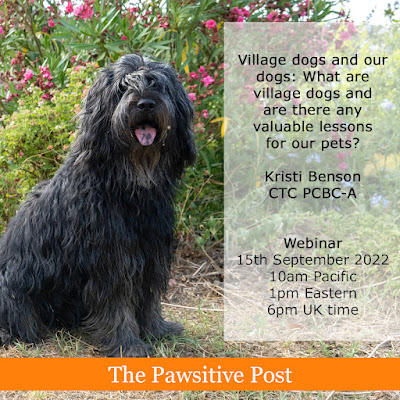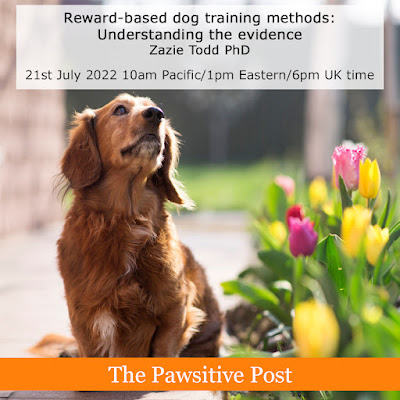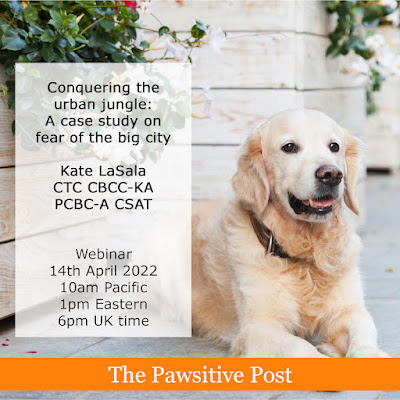The Pawsitive Post Calendar of Events
The calendar of events for The Pawsitive Post.
This is the schedule of upcoming events from The Pawsitive Post. Come and be part of a community of animal lovers--or wait and watch the recording later.
Your ticket to these events is included in your subscription to The Pawsitive Post newsletter. We can't wait to see you there!
Sorry but The Pawsitive Post is no longer taking new subscribers.
Upcoming 2022 Events
All online events are at 10am Pacific/1pm Eastern/6pm UK time.
Each webinar has a value of $30 and is included FREE with your monthly subscription. Recordings are available for most webinars until the end of the following month. CEUs available (details below).
Aug 4 Reward-based dog training methods: understanding the evidence. Webinar by Zazie Todd PhD
Aug 11 Journal Club led by Zazie Todd PhD. A discussion of the effects of dog training method on optimism/pessimism.
Sep 15 Village dogs and our dogs: What are village dogs and any valuable lessons for our pets. Webinar by Kristi Benson CTC PCBC-A
Oct 13 Talking to the media about dogs and cats. Webinar by Zazie Todd PhD.
Nov 3 Wonderdog: The Science of Dogs and Their Unique Friendship with Humans. Webinar by Jules Howard (N.B. The time for this one is 11am Pacific/2pm Eastern/6pm UK time).
Nov 10 Dog welfare in the veterinary clinic: Exploring ways to mitigate dog stress and improve the veterinary experience for both the dog and owner. Webinar by Anastasia Stellato PhD
Dec 8 What not to do to your dog (according to science) by Zazie Todd PhD
Further Details
Reward-based dog training methods: Understanding the evidence
- Define reward-based and aversive methods in dog training
- Summarize the evidence on different approaches to dog training in terms of animal welfare and effectiveness
- Evaluate the scientific research especially survey and quasi-experimental studies
- Apply the research to real-life dog training situations
Village dogs and our dogs: What are village dogs and any valuable lessons for our pets
Kristi Benson CTC PCBC-A
Sep 15 2022. Recording available until the end of October.
 |
Many dog guardians, dog behaviour experts, and dog researchers have a keen interest in village dogs (and other dogs who live at large). Some of the interest is simple: a curiosity about how these dogs live. However, some people suggest that village dogs live a life which is much improved, welfare-wise, over the life of a pet dog. In this webinar, dog trainer and anthropologist Kristi Benson will provide an introduction to village dogs (including definitions and geography). She will also review welfare-compromised and positive aspects of village dogs lives before looking at some of the lessons we can learn for pet dogs: enrichment, foraging, socializing, environmental choices, and so on. She will also comment on some of the potential pitfalls and flaws in the discussions about village dogs.
Learning objectives:
- Evaluate sources of expertise on village dogs and dog welfare
- Understand the difference between seeking good consequences vs. getting relief, and why those separate motivations matter to this topic
- Identify the naturalistic fallacy in the context of discussing village dogs
- Develop new ways to improve pet dog welfare based on lessons from village dogs
Talking to the Media about Dogs and Cats
- Develop an understanding of why pet professionals should talk to journalists and how to make it happen
- How to determine (and stick to) the main message(s) you would like to focus on
- Understand the requirements of different types of media (print, podcast, radio, TV)
- Identify the best ways to practice in advance and continue to develop your media skills
Wonderdog: The Science of Dogs and Their Unique Friendship with Humans
Dog Welfare in the Veterinary Clinic: Exploring Ways to Mitigate Dog Stress and Improve the Veterinary Experience for Both the Dog and Owner
- Identify fear indicators commonly displayed during a routine veterinary examination.
- Determine whether dog fear responses during veterinary examinations can be reduced by
- changing aspects of the physical and social environment, and by providing training.
- Identify methods of prevention based on risk factors associated with fear and aggression
- within veterinary clinics.
- Determine whether owner perspectives align with current handling recommendations.
CEU and Event Policy
Most webinars are eligible for CEUs from CCPDT, PPAB, and/or IAABC. See individual webinar details for information on the CEUs that are available.
If you arrive late for a webinar and missed the first code word for CEUs, please don't ask about it; you'll be able to get it from the recording. The second code word will be given out later in the recording.
We take a register of attendance at events. Please note that webinars (and some other events) are recorded and the recordings will be made available to subscribers.
Subscribers who registered for a webinar will receive a link to the recording the day after the event. In addition, the link will be included in future issues of The Pawsitive Post. Recordings are typically available until the end of the following month.
If you have questions or want to suggest particular organizations that you are interested in CEUs from, please get in touch.
We are a friendly, respectful community and expect participants to behave in ways that reflect the friendly, professional, and diverse nature of our community.
We reserve the right to make changes if necessary (e.g. to reschedule due to illness or unforeseen events).
Previous Events
A serious game: Understanding cats' predatory and play behaviour.
Mikel Delgado PhD
June 9th 2022 (Recording available through July 31st).
Play behavior is found throughout the animal kingdom and offers many potential benefits for skill-building and survival, not to mention physical and mental health. But how can we define, recognize, and encourage play in our own pet cats? In this presentation, I will first address how play has been identified and defined in the scientific literature, as well as some of the arguments for and against its evolutionary benefits. I will review the key studies related to play in cats, and will address some of the current gaps in our knowledge and possible future directions for research. The presentation will conclude with practical tips on applying research findings and encouraging successful playtime for our cats at home.
Learning objectives:
- Understanding the characteristics of play behavior in cats
- Interpreting key findings from some important scientific studies of cat play behavior
- Learning techniques to improve cat welfare through play/enrichment
Conquering The Urban Jungle: A Case Study On Fear Of The Big City
Kate LaSala CTC CBCC-KA CSAT PCBC-A
April 14th 2022
Dogs are often transported hundreds or thousands of miles, whether due to rescue transport or purchasing from a breeder. Oftentimes these dogs end up in environments very different from where they came from. Transporting dogs to urban areas from rural ones can cause adjustment and fear issues, if the dog hasn’t been properly socialized. Kate discusses one such case of a dog transported from the rural south in the US to NYC, who was terrified of walking outside with all the hustle and bustle of Brooklyn. She will review her training decisions, setbacks during the case, working with a VB for medication assistance and all the other factors that contributed to a successful outcome for this case.
Learning objectives:
- Understanding the origin of fear in dogs and the role of lack of socialization and early experiences play in fear
- Importance of going at your dog’s pace
- Creating safe spaces
- Triaging behavioral issues
- Training cues for cooperation and consent
- Dealing with setbacks/slow progress
- Importance of communication and cooperation between vet behaviorist and behavior consultant/trainer
Managing a multi-dog household: The lazy dog trainer edition
Kristi Benson CTC PCBC-A
Jan 13th 2022
In this webinar, Kristi Benson will delve into the ways the guardians of a multi-dog household can make their living situations more peaceful and joyful, for both the humans and the dogs involved. She’ll review safety factors in having a home with multiple dogs, including how dogs function as social carnivores and how and why other pets and small children may be at risk. She will delve into “management”, or the prevention of problem behaviours before they start, when dealing with multiple animals. She will also cover useful tricks and tools for both management and training, how to maximise training set-ups, how and when to train on-the-fly, and the logistics of comfortable down-time. Kristi will cover how to comfortably bring clients on board with kinder techniques and dismantling client myths about behaviour and dynamics among multi-dog homes. She will also tackle how to have tricky conversations about re-homing and permanent separation of animals in a single home.
Kristi has lived with up to 13 dogs in her home when she was running a sled dog rescue and has tested and streamlined effective and welfare-forward techniques to meet everyone’s needs while keeping the (relative) peace in a busy home.
Learning objectives:
- Identify safety considerations for multi-dog households, including with cats and children.
- Understand the basics of predatory behaviour and acquired bite inhibition.
- Understand and implement management (response prevention) for multi-dog households to reduce problem behaviours including fighting.
- Identify useful and important training plans, and how to effectively train in a multi-dog household.
- Understand the basics of classical conditioning and how to use it in a solo-counterconditioning protocol on-the-fly.
- Identify and reduce risk/harm in worst-case scenarios.
CEUs: PPAB 1 CEU.
Zazie Todd, PhD
Feb 10th 2022
One of the great things about feline science—as well as the fact it’s fascinating—is that it has so much practical relevance to our everyday lives with cats. This webinar will begin with a look at some of the things we know are important for good cat welfare and why they matter. Then, we’ll look in detail at some of the specific research studies that have been conducted in feline science to see how the research was done and what it tells us. Along the way we’ll consider why it’s so difficult to study pet cats, and what the results mean for making our own cats happier.
You do not need a scientific background to attend this webinar—just a curiosity about cats.
Learning objectives:
- Outline ways of looking at good cat welfare
- Understand a scientific approach to studying pet cat behaviour
- Discuss the results of specific studies in feline science
- Identify ways to help pet cats be less stressed and more happy









